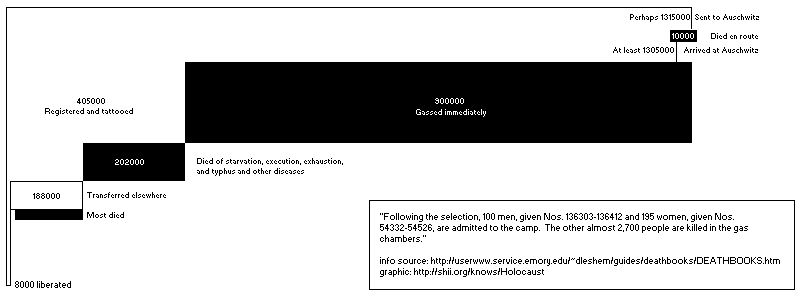The following website is a decent resource about the Holocaust and an excellent website for debunking Holocaust deniers:
One thing that is not clear when you go to the Holocaust Museum in DC is why there were only 405,000 registered prisoners at Auschwitz. You see a diagram of the gas chambers but (perhaps because I was horrified by that part of the exhibit) it was not clear to me who it was who went to those gas chambers. The truth is that the registered victims and the gassed victims are two separate groups with little overlap, as explained here:
http://userwww.service.emory.edu/~dleshem/guides/deathbooks/DEATHBOOKS.htm
I have made a graphic to explain these numbers. It is inexact.
Contents |
Holocaust memoirs and their authors
In response to a troll complaining that most Holocaust memoirs are faked, here is a list of authors and their memoirs. This is based on Wikipedia information but as far as I can tell it is the first list of memoirs by author and date. As you can see there was not a big market for Holocaust stories immediately after the war-- Communists suppressed it and publishers rejected it. It took a while before the reality could be fully understood.
- Mary Berg
- Warsaw Ghetto (1945) (details)
- Władysław Szpilman
- Śmierć miasta (1945, suppressed)
- The Pianist (1998, new edition)
- Primo Levi
- If This Is a Man (1947, suppressed)
- If This Is a Man (1956, new edition)
- The Truce (1969)
- The Black Hole of Auschwitz (2005)
- Auschwitz Report (2006)
- Viktor Frankl
- Man's Search for Meaning (1984)
- Charlotte Delbo
- Auschwitz and After (1985)
- Gerda Weissmann Klein
- One Survivor Remembers (1995)
- Trude Levi
- A Cat Called Adolf (1995, LoHT)
- Anne L. Fox
- My Heart in a Suitcase (1996, LoHT)
- Shalom Yoran
- Defiant (1996)
- David Faber
- Because of Romek (1997)
- Ana Novac
- The Beautiful Days of My Youth (1997)
- Ruth Minsky Sender
- The Cage (1997)
- Simon Wiesenthal
- The Sunflower (1998)
- Rivka Lozansky-Bogomolnaya
- Wartime Experiences in Lithuania (2000, LoHT)
- Yehuda Nir
- The Lost Childhood (2002)
- Willy Berler
- Journey Through Darkness (2003, LoHT)
- Dina Babbitt
Prior to the 1990s most Holocaust experiences were not published as popular memoirs but recorded in yizkor books, usually in Hebrew or Yiddish. Here's an example of an English entry in a yizkor book.
The Library of Holocaust Testimonies has published many other books as well, especially starting in 2000.
Victims' diaries
- Anne Frank
- Diary (published 1947)
- The popular edition was edited by Anne Frank's father, but the original manuscripts are available and have been published in English.
- Diary (published 1947)
- Yitskhok Rudashevski
- Diary of the Vilna Ghetto (published 1973)
- Éva Heyman
- Diary (published 1974)
- Moshe Flinker
- Diary (published 1979)
- Etty Hillesum
- Diary (published 1981)
- Dawid Rubinowicz
- Diary (published 1982)
- Jerzy Feliks Urman
- Diary (published 1991)
- Oskar Rosenfeld
- In the beginning was the ghetto : notebooks from Łódź (published 1994)
- Dawid Sierakowiak
- Diary (published 1997)
- Janusz Korczak
- Ghetto Diary (2003)
- Helga Deen
- Diary (published 2004)
- Rutka Laskier
- Diary (published 2005)
- Petr Ginz
- Diary (published 2007)
- Helene Berr
- Journal (published 2008)
Ghostwritten
- Marthe Cohn
- Behind Enemy Lines
- with Wendy Holden
- Behind Enemy Lines
- Corrie ten Boom
- The Hiding Place
- with John and Elizabeth Sherrill
- The Hiding Place
- Leo Bretholz
- Leap into Darkness
- with Michael Olesker
- Leap into Darkness
- Sabina Wolanski
- Destined to Live (2008)
- with Diana Bagnall
- Destined to Live (2008)
Fiction
- Elie Wiesel
- Night, Dawn, Day, The Oath
- Not meant to be memoirs, although Wiesel denies they are novels.
- Night, Dawn, Day, The Oath
- Imre Kertész
- Fateless
- Published as a novel.
- Fateless
Here we come to the frauds. As you can see, the first fraud appeared in 1995. The first Holocaust memoirs, though, appeared just years after the war, and by the 1980s there were many of them. If there was an international Jewish conspiracy the quality of the "fake memoirs" would get better, not worse, as the years passed. These frauds are the product of (1) preexisting knowledge of the Holocaust and (2) a shameful attempt to cash in on it.
- "Binjamin Wilkomirski"
- Fragments: Memoirs of a Wartime Childhood (1995)
- Complete fraud.
- Fragments: Memoirs of a Wartime Childhood (1995)
- "Misha Defonseca"
- Misha: A Mémoire of the Holocaust Years (1997)
- Complete fraud.
- Misha: A Mémoire of the Holocaust Years (1997)
- Herman Rosenblat
- Angel at the Fence: The True Story of a Love That Survived (2008)
- Fraud written by a real Holocaust survivor after a brain injury.
- Angel at the Fence: The True Story of a Love That Survived (2008)
![[Everything Shii Knows]](../mediawiki/skins/common/images/wiki.png)
